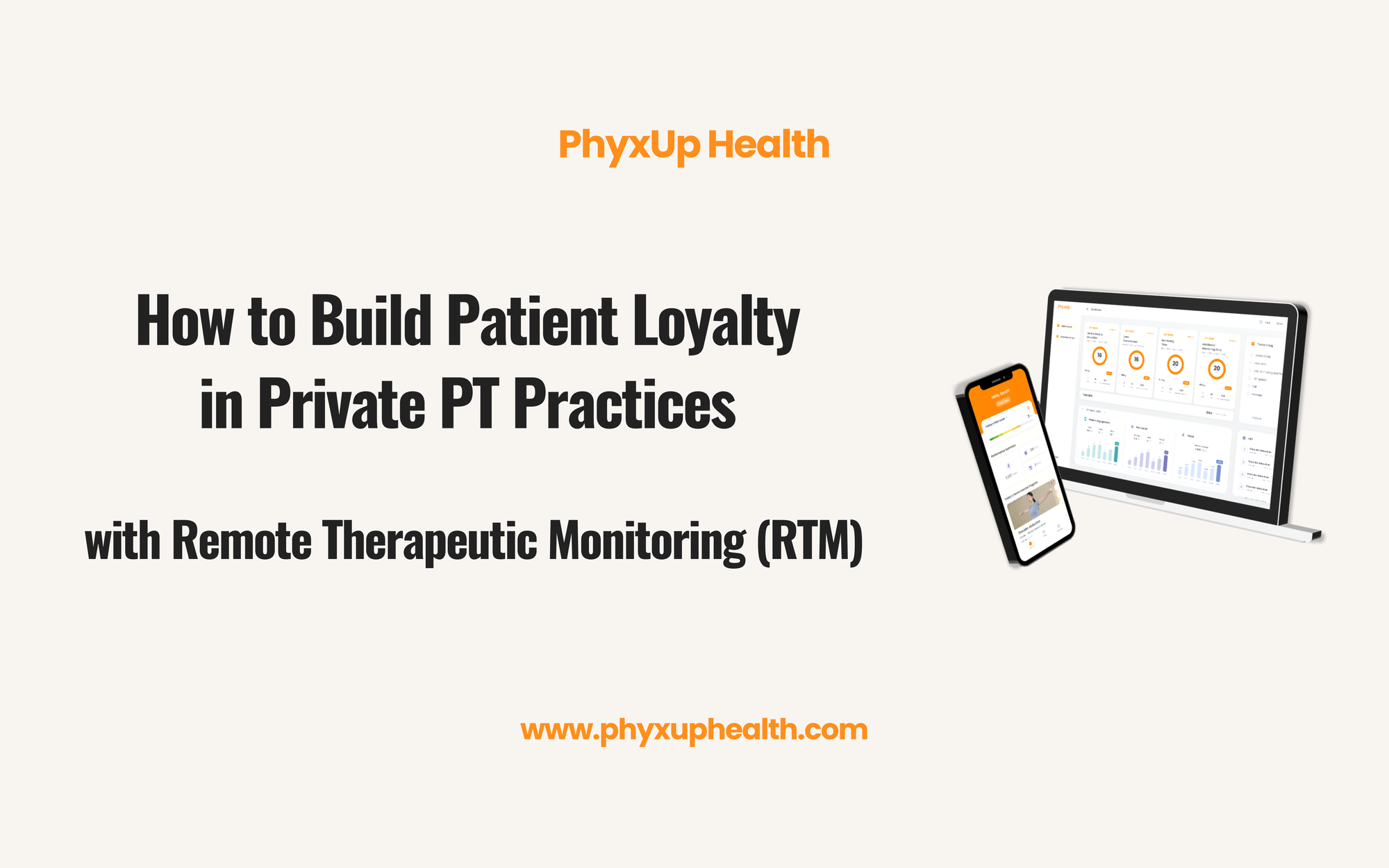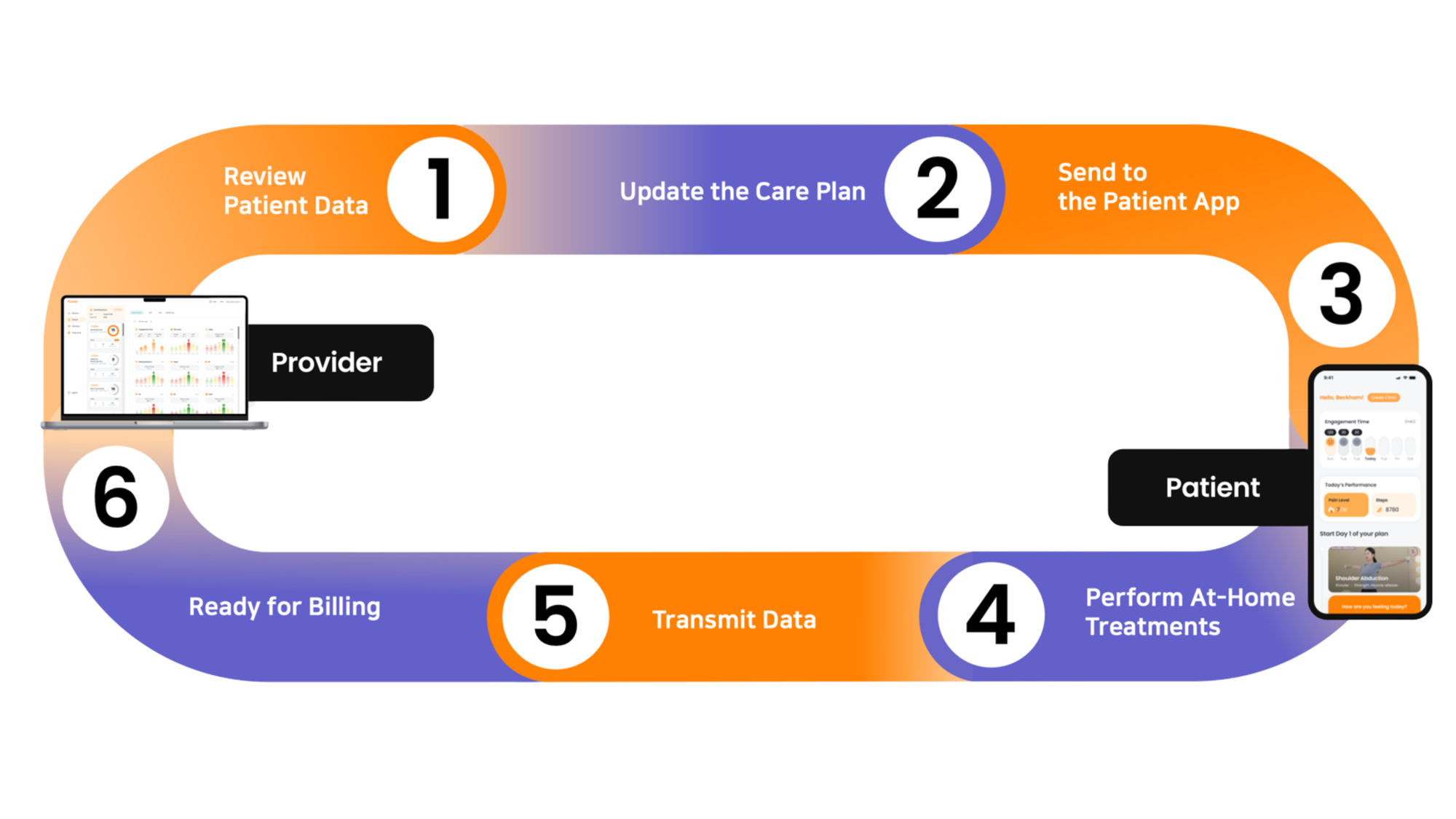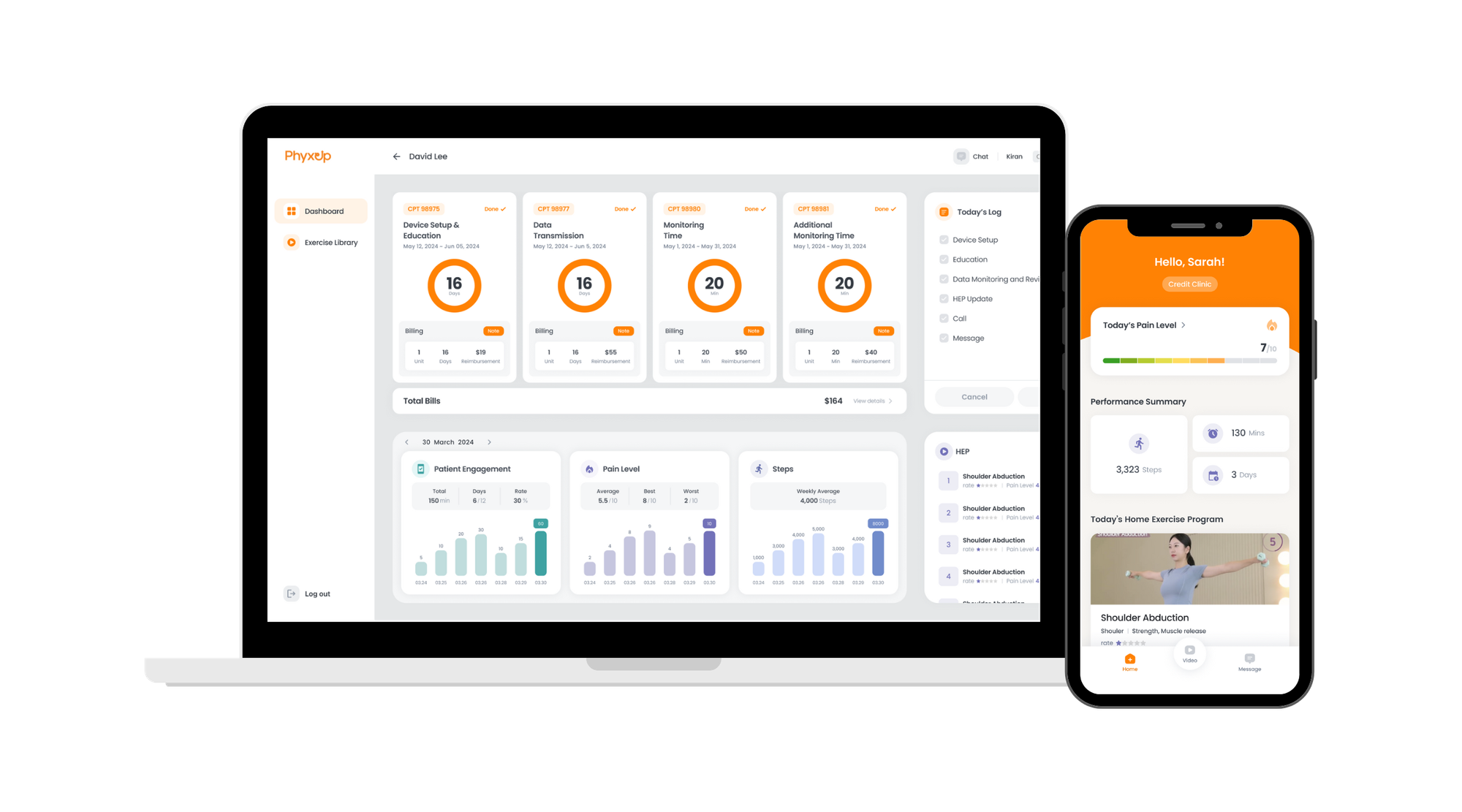Building Patient Loyalty in Private PT Practices with Remote Therapeutic Monitoring (RTM)

In today’s competitive healthcare market, patient loyalty is more important than ever, particularly for private physical therapy practices that rely on personalized care and strong provider-patient relationships. Unlike large healthcare institutions, private practices thrive on the trust and long-term engagement of their patients. As the healthcare landscape continues to evolve, these practices need innovative solutions to build and maintain patient loyalty.
Remote Therapeutic Monitoring (RTM) is one such solution, helping private physical therapy practices not only provide high-quality care but also foster patient loyalty and long-lasting relationships.
What is Remote Therapeutic Monitoring (RTM)?
Remote Therapeutic Monitoring (RTM) is a service that allows physical therapists to track and manage a patient’s progress remotely using digital tools. It involves sending customized Home Exercise Programs (HEPs) to patients via a web or mobile app, where they can complete and log exercises. Therapists can monitor the data in real time, such as pain levels and mobility improvements, and adjust treatment plans as needed.
Key Features of RTM:
- Sending Exercises: Therapists send exercises to patients, who can log their completion and progress.
- Real-Time Data Tracking: Metrics like pain levels and exercise adherence are tracked to adjust treatment plans accordingly.
- Continuous Communication: Patients can ask questions or report issues, and therapists can offer real-time guidance.

RTM CPT Codes & Billing: Simplifying Reimbursement for Providers
With the introduction of CPT codes for RTM services, private physical therapy practices now have an opportunity to offer an additional service that generates extra revenue.
These codes enable providers to be reimbursed for their time spent remotely monitoring patient progress, allowing them to integrate RTM into their practice without affecting the bottom line. Below are the five key CPT codes that support RTM services:
- CPT Code 98975 – This code is used for the initial setup of RTM services, including the provision of devices and patient education on how to use the remote monitoring equipment.
- CPT Code 98977 – This code applies to the remote monitoring of non-physiologic data, such as the tracking of a patient’s adherence to home exercise programs (HEPs) or their progress with pain management.
- CPT Code 98980 – This code is for the remote therapeutic monitoring of data interpretation and care management. It covers at least 20 minutes of time spent reviewing the patient’s data, adjusting their treatment plans, and communicating with the patient based on the results.
- CPT Code 98981 – This code applies to additional data interpretation and care management for patients with more complex needs. It includes at least 20 minutes of extra time spent on reviewing patient data, assessing treatment changes, and providing additional communication and coordination.
By using these specific codes, private physical therapy practices can receive reimbursement for the time spent on remote monitoring and patient management, making RTM a financially sustainable addition to their services.
How RTM Enhances Patient Loyalty and Engagement
RTM plays a crucial role in building patient loyalty by providing personalized, consistent care that keeps patients engaged in their recovery process.
- Tracking Patient Progress in Real-Time: RTM enables providers to monitor patient recovery in real time, ensuring that progress is accurately tracked. This visibility motivates patients by showing them the tangible improvements in their health, which strengthens their commitment to the treatment plan and increases loyalty.
- Continual Communication: One of the key factors in building patient loyalty is consistent communication. RTM fosters continuous communication, allowing patients to share their experiences and receive timely responses from their providers. This open communication builds a stronger, more reliable relationship between patient and provider.
- Facilitating Evidence-Based Decisions: RTM generates detailed progress reports, allowing providers to make informed, data-driven decisions. By showing patients that their care is based on measurable, objective data, RTM reassures them that their treatment plan is tailored specifically to their needs, increasing their loyalty to the provider.
Addressing Common Barriers to Patient Loyalty with RTM
Private physical therapy practices often face challenges in building and maintaining patient loyalty due to limited resources or competition from larger institutions. RTM helps overcome these barriers by providing a continuous and personalized experience:
- Barrier 1: Lack of Personalized Care – RTM allows for individualized care by continuously tracking patient progress and making real-time adjustments to the treatment plan, ensuring patients feel their specific needs are being addressed.
- Barrier 2: Inconsistent Follow-Up – RTM enables seamless follow-ups through remote monitoring, ensuring that patients receive consistent support and encouragement throughout their recovery, which strengthens their loyalty.
- Barrier 3: Limited Evidence of Progress – RTM provides clear, visual progress reports, allowing patients to see how much they've improved. This reinforces their confidence in the treatment and deepens their loyalty to the practice.
Building Long-Term Relationships with RTM
RTM isn’t just about immediate improvements. It helps establish long-term relationships between patients and providers. By ensuring continuity of care and keeping patients engaged, RTM plays a vital role in building patient loyalty over time.
- Consistency in Care Delivery: RTM tracks patient progress consistently, ensuring that treatment plans remain on track. This regular monitoring builds trust in the provider’s ability to deliver consistent and effective care, encouraging patients to stay committed to their treatment.
- Encouraging Patient Engagement: RTM actively involves patients in their recovery process by allowing them to track their progress and communicate directly with their provider. This active involvement fosters a deeper sense of engagement and commitment to the treatment, which strengthens patient loyalty.
- Educating Patients: RTM also serves as an educational tool, helping patients understand their treatment plan and the importance of adherence. By providing clarity, RTM empowers patients to take ownership of their recovery, further boosting their loyalty to the provider.

Enhancing Loyalty During Cancellations and Absences
RTM also proves to be invaluable during situations like last-minute cancellations, no-shows, or patient vacations. When patients are unable to attend in-person sessions due to scheduling conflicts, vacations, or other reasons, RTM ensures that their treatment progress doesn't stall:
- Last-Minute Cancellations & No-Shows: With RTM, patients can still engage in their treatment from the comfort of their home, even if they miss an appointment. This flexibility helps maintain momentum in their recovery process, preventing the disruption of their treatment plans and fostering a sense of reliability in the practice.
- Vacations & Absences: When patients go on vacation or need to be away for an extended period, RTM allows them to continue monitoring and participating in their recovery, ensuring they stay on track despite being away. This not only minimizes disruptions in treatment but also shows patients that the provider is committed to their long-term health and success.
PhyxUp Health: A Case Study in Patient-Centered Care
PhyxUp Health is a leader in providing RTM solutions tailored for private physical therapy practices. By offering real-time tracking, detailed progress reports, and continuous patient interaction, PhyxUp Health helps practices deliver personalized, accountable care that builds long-term patient loyalty.
With PhyxUp Health, private practices can:
- Provide patients with an easy-to-use Home Exercise Program (HEP) app.
- Track and update patient activity in real-time.
- Offer patients easy access to their health data.
- Enhance patient loyalty by providing actionable insights into treatment progress.
For example, a physical therapy practice using PhyxUp Health reported an 80% increase in patient engagement and over 95% patient satisfaction, highlighting the power of RTM in improving patient outcomes and building lasting relationships.
Conclusion: Strengthening Patient Loyalty with RTM
In the rapidly evolving healthcare market, patient loyalty is crucial for the long-term success of private physical therapy practices. RTM provides an innovative way for these practices to enhance patient engagement, improve care delivery, and build lasting relationships.
By offering solutions like PhyxUp Health, private practices can ensure they provide personalized, accountable care that keeps patients loyal and committed to their recovery journey. Ultimately, RTM empowers practices to foster patient loyalty, improve outcomes, and maintain a competitive edge in today’s healthcare environment.
